
CLASSROOM LESSONS
HOLOCAUST EDUCATION

International Human Rights Day, December 10, marks the anniversary of the United Nations General Assembly adopting the Universal Declaration of Human Rights (UDHR) in 1948. This landmark occasion happened the day after the Assembly adopted the Convention on the Prevention and Punishment of the Crime of Genocide. These back-to-back dates were not coincidental, and they are inherently meaningful to any educator who teaches about the past; particularly for Holocaust educators, since both of these documents have their roots in the Holocaust. In our current climate, this anniversary feels somehow extra pressing. Almost daily, we are assaulted with news of human rights violations and instances of what could be called genocide—from the Rohingya in Myanmar to the continuing violence in Syria—and it is easy to feel overwhelmed.
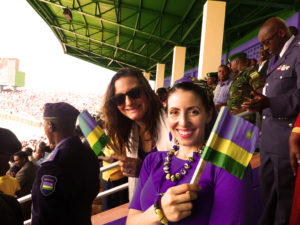
As educators, we have faced the challenge of teaching topics related to violations of human rights, and genocide in particular. We can easily imagine that many of you struggle with the balance between worrying about the emotional toll of the subject on your students, while also knowing the critical importance that teaching about genocide can have in the prevention of future atrocities. We know that when teaching about the Holocaust, larger questions surrounding genocide will inevitably arise in the classroom. For the past several years, the Echoes & Reflections team members have heard teachers express a need and desire for a path forward to explore this broader topic, and we are pleased and proud to be able to now provide that guidance.
The story behind our involvement with Echoes & Reflections’ new educator resource, “Teaching about Genocide,” is deeply personal. The authors of this post met as graduate students and fostered a friendship that has spanned nearly two decades and has included research trips on three continents. We have taught at the university level and led educational experiences at sites of genocidal violence. Our experiences in Rwanda and at sites of Holocaust remembrance in Europe have steeped us in a deep sense of responsibility to continue to educate about the dangers of unchecked hatred and violence. In the words of Paul Parks, an African-American WWII veteran who witnessed Dachau after liberation and played an active role in the American Civil Rights Movement, “I know what the end of bigotry looks like…from the standpoint of the bigot…I’ve seen it, and I don’t want that ever to happen again.” (To hear more from Paul, explore the Survivors and Liberators unit that features his experiences during WWII or IWitness to watch his testimony). We have seen what “the end of bigotry” looks like; we have seen the powerful effect that learning this has on students’ and we know that it is complicated, delicate work. We urgently feel the importance of supporting fellow educators as they engage in these topics with their students. Given our history, we jumped at the chance to work together on the development of a resource to help teachers approach the subject of genocide in the context of their students’ Holocaust education. Getting to work with a good friend and colleague on a topic of critical importance to your value system and to the world was a gift, yet,we weren’t sure how to begin.
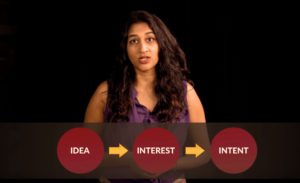 So we came to you. This past spring, we conducted a nationwide survey that resulted in responses from nearly 200 teachers from 25 states plus the District of Columbia. We asked you—the Echoes & Reflections community—what you needed. In addition to seeking introductory materials about the concept of genocide and how to frame that with students, we learned that age-appropriate, primary source-driven content, including brief videos, would be effective and welcome classroom tools. The resulting resource uses Dr. Gregory Stanton’s model of the “Ten Stages of Genocide” to help you navigate this topic with students. The site includes a number of resources, including more than 20 clips of audio-visual testimony from survivors of the Holocaust and genocides in Armenia, Cambodia, and Rwanda, as well as brief overviews of the genocides discussed in the testimonies, and a graphic organizer to help students engage with the testimonies from survivors of genocide (for other tips on how to effectively use testimony in your instruction, explore this document).
So we came to you. This past spring, we conducted a nationwide survey that resulted in responses from nearly 200 teachers from 25 states plus the District of Columbia. We asked you—the Echoes & Reflections community—what you needed. In addition to seeking introductory materials about the concept of genocide and how to frame that with students, we learned that age-appropriate, primary source-driven content, including brief videos, would be effective and welcome classroom tools. The resulting resource uses Dr. Gregory Stanton’s model of the “Ten Stages of Genocide” to help you navigate this topic with students. The site includes a number of resources, including more than 20 clips of audio-visual testimony from survivors of the Holocaust and genocides in Armenia, Cambodia, and Rwanda, as well as brief overviews of the genocides discussed in the testimonies, and a graphic organizer to help students engage with the testimonies from survivors of genocide (for other tips on how to effectively use testimony in your instruction, explore this document).
We hope that as teachers approach International Human Rights Day, this new Echoes & Reflections resource can serve as another helpful source to continue to do the good work that you do every day—teaching about the past to build a better future.
About the Authors: Dr. Amy Carnes is the Program Manager – Development at USC Shoah Foundation and Dr. Emily Musil Church is a Historian of Africa and Human Rights at USC Shoah Foundation.

BYSTANDERS
HOLOCAUST REMEMBRANCE
LITERATURE

The day I began teaching eighth grade, I was handed a copy of Anne Frank, the Diary of a Young Girl. I was asked to teach it. The problem was…I had never read this book. It took me a few hours to get to know Anne, but once I did, I was hooked, but I also realized that the “it” I was being asked to teach came with an enormous responsibility. Where would I begin? How would I teach about the Holocaust in a way that had meaning for young teenagers?
I have been teaching Holocaust literature now for ten years. I have studied and become familiar with the resources available from the United States Holocaust Memorial Museum and Echoes & Reflections, which provide me with a sound pedagogy for teaching about the Holocaust. Still, given recent events that have rocketed the ideology of hate and intolerance onto the front page, I am once again struggling to find the path forward to incorporate the lessons of the Holocaust with the world my students are facing and the news that surrounds them.
As we prepare to remember the 79th anniversary of Kristallnacht, I find that the material from the Echoes & Reflections lesson, Kristallnacht: “Night of Broken Glass” in the Studying the Holocaust Unit provides me with an excellent entry point. In this lesson, Holocaust survivor Kurt Messerschmidt provides his first-person account of Kristallnacht. Although I am not a history teacher, I find his story compelling, and unfortunately, still timely. Kurt speaks of the silence he witnessed in response to that day and there is much to be learned from his testimony. Learning about Kristallnacht as a turning point in Holocaust history provides important context and offers an essential question we discover time and again in the Holocaust literature, “Would I have been a bystander, hiding behind silence?”
Unfortunately, my students see hate and the consequences of hate on television and in social media every day. When Kurt says, “Their disapproval [of Nazi actions] was only silence, and silence was what did the harm,” I challenge my students to consider if they are allies or silent bystanders in their own lives. We look at events, not only in the United States, but around the world, that are a result of hate and intolerance and consider appropriate actions.
My students and I explore a wide variety of Holocaust literature throughout my unit, and the students use the lesson about Kristallnacht and Mr. Messerschmidt as a year-long theme. We examine the results of inaction. What would those two Nazis at the cigar shop have done if the crowd of forty or fifty bystanders would have all started picking up the glass? I ask them to consider the ways that they can pick up the symbolic shards of glass that litter the landscape of our schools, communities, and beyond. We address silence in the context of World War II and the Holocaust, but I also show and discuss how it can be translated to current events. This year, I will also show the remarks of Holocaust survivor Sonia Klein to CNN after the events in Charlottesville, when she stated, "Silence is the first thing after hate that is dangerous because if you are silent, it is an approval of what's going on." I will show Sonia alongside Mr. Messerschmidt’s testimony to bridge the gap of decades between World War II and today.
This theme is also integrated into my advanced English classes when we read Elie Wiesel’s Night, and consider what Wiesel meant, when in his Nobel Prize acceptance speech he stated, “I swore never to be silent whenever and wherever human beings endure suffering and humiliation. We must take sides. Neutrality helps the oppressor, never the victim. Silence encourages the tormentor, never the tormented.” We also consider Anne Frank’s excruciating words when she wrote, "Sleep makes the silence and the terrible fear go by more quickly, helps pass the time, since it's impossible to kill.” At this point, silence has taken on a new meaning for my students. Anne Frank could not have been anything but silent, as she was in hiding, yet the power and bravery of her writing gave her a voice that continues to inspire millions.
Expanding on the theme this year, I will also implement the concept of “silence” into our poetry unit. The lyrics of the 1964 Simon and Garfunkel song “The Sound of Silence” will be introduced for student interpretation. I am excited to see how my students will translate the theme into poetry.
Teaching students about Kristallnacht is an opportunity for students to critically examine pivotal moments in history and to consider how their own actions or silence in the times in which they live will have far-reaching implications. As I have grown as an educator, inspired by the words of Anne Frank, Elie Wiesel, Kurt Messerschmidt, and others, I am gratified to have discovered the many ways that this history can be approached in my curriculum, and to have seen how this teaching not only promotes my students’ academic learning, but also their emotional and moral development as citizens of the world.
About the Author: Kristy Rush is an 8th grade English Language Arts educator at Pine Richland Middle School. She lives in Wexford, PA.

ANTISEMITISM
CURRENT EVENTS

Americans know it’s not always pleasant to watch free speech in action.
As we witnessed this summer in Charlottesville, free speech can be hateful. It can be corrosive and demeaning. And yet, as Americans, we are dedicated to protecting free speech to a degree that our counterparts in other countries find astonishing—even ill-considered. It’s part of our Constitution, and part of our national character.
A 2015 Pew Research Center study of attitudes in 38 countries found that Americans are more tolerant of free speech than citizens of any other nation. Seventy-one percent of US respondents said they believe people should be able to say and write what they like without government interference or censorship.
Our full-throated commitment to free speech doesn’t mean we always have an easy relationship with it—the First Amendment has faced countless legal challenges from those who argue that our freedom of speech has actually become a freedom to intimidate, or a freedom to instill fear. That tension was famously on display in 1978, when the city government of Skokie, Illinois, filed a suit to stop neo-Nazis from marching through their town. At the time, Skokie, a suburb of Chicago, was home to an unusually high number of Holocaust survivors, and the mayor and other officials argued that the neo-Nazis’ right to free speech paled in comparison to the survivors’ right not to be terrorized. The ACLU stepped in to defend the neo-Nazis’ First Amendment rights, and the case went all the way to the US Supreme Court, which ruled in favor of the ACLU and the First Amendment. The neo-Nazis never marched in Skokie—they took their awful, legally-protected speech to Chicago, instead.
As a writer and researcher at the Anti-Defamation League’s Center on Extremism, I know that the Skokie case remains painfully relevant, even today. I know how challenging it can be to balance the legal right to free speech with the much more human need for all citizens to feel safe.
My job involves monitoring and writing about some of the most hateful groups and people in America—from the Ku Klux Klan to neo-Nazis to anti-Muslim extremists. Every day, my colleagues and I are confronted with images and words of hate and vitriol. We read about Richard Spencer’s dreams for a white ethnostate. We listen to Milo Yiannopoulos disparage transgender people. We watch videos of speeches by anti-Muslim bigots like Pamela Geller and Frank Gaffney, who capitalize on fear and xenophobia and blame an entire religion for the actions of a few extremists.
We listen to these hateful people speak because it’s part of our jobs. We also listen because we need to know what they are saying. Their speech is real, and it affects people’s lives. And that’s the main reason we need to protect their right to speak publicly and freely.
Hateful speech that is muffled or suppressed will still exist. It will just go underground, where it has the potential to become even more powerful. People who are prone to extremism are often drawn to ideas and movements that society deems inappropriate.
I’m also a firm believer in countering vile speech with good speech. Whenever neo-Nazis march, the rest of us have to show up to peacefully protest the swastikas, racism and anti-Semitism on display. Whenever a Klan group leaves recruitment fliers on suburban doorsteps, the rest of us need to come together and make sure that every member of our community feels supported and safe.
The First Amendment is a right that confers huge responsibility. At this moment in history, the responsibility part of the equation seems to be falling to those of us who believe in civil rights, equality, and kindness.
Students who are keeping up with the news will undoubtedly have questions, and possibly concerns, about the practicability and ethics of protecting free speech, even when that speech feels confrontational, offensive, or just plain wrong. It’s a conundrum that can feel uncomfortable, and it’s important to allow the conversation to be in that place of discomfort. That’s where real critical thinking happens—about individual rights and the responsibilities inherent in living in a democracy. Ask your students how they feel about the rights of neo-Nazis to march in Skokie. Ask them how they might respond to a hateful person coming to speak in their city. Allow them to take up the different sides of the arguments, and help them understand that while the First Amendment is a bedrock principle, applying it fairly and objectively isn’t always easy.
After all, it’s no small feat to respect an individual’s right to express bigoted ideas. But that’s what Americans have always done. Just as one bigot has the right to speak his mind, the rest of us have a responsibility to let him know we’re watching, we oppose his hate—and we’re not going away.
Jessica Reaves is the senior writer and communications specialist at ADL’s Center on Extremism. The views expressed here are hers alone.

CURRENT EVENTS
TEACHING

This year Echoes & Reflections created its inaugural Educator Advisory Committee (EAC). The purpose of the Committee is to gather thoughtful and diverse educators from around the United States to provide us with expert educational guidance and feedback so we can continue to offer the highest quality of Holocaust education professional development to teachers. In the aftermath of the events in Charlottesville, we reached out to our members to understand how as they return to the classroom they hope to inspire their students through the lens of Holocaust education.
Here are some of their responses:
Susan Schinleber
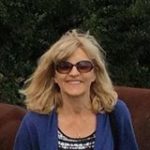
“The events in Charlottesville over the weekend speak more eloquently than I ever could and explain in stark and horrifying terms why we need to teach the Holocaust to our students. I feel compelled to teach this subject now more than ever and for so many reasons: to bear witness; to teach students that their actions count; to show that the Holocaust was never inevitable. Learning about the Holocaust helps our students make the connection between what happened then and what is happening in the world around them. I never stop reading and studying what happened then and I bring that passion to the classroom and hope that it sows the seeds it needs to.”
Susan Schinleber teaches English and Public Speaking at North Shore Country Day School, a K-12 private school in Winnetka, IL.
Eden C. Stein, Ph.D.
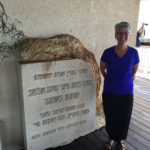
“This year my 8th graders will return to school horrified, with questions and anger over what has recently transpired in Charlottesville. “Why do people hate the Jews?” is a question I have often heard. They will be eager to read a Holocaust memoir and to learn about the history of antisemitism along with the history of racism. Following the reading of these important books they will be inspired to do something. In my Language Arts classroom, that something will be to write letters for social change – real letters that will actually be sent to a local, state, or national legislature. My hope is to also inspire them to recognize bigotry, racism and antisemitism in the world surrounding them and speak up to eradicate it.”
Eden C. Stein is certified for Language Arts and Social Studies 4-8 and History 7-12. She teaches at Worthington Hooker School in New Haven, CT.
Susan Davenport
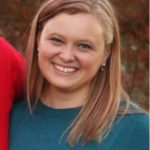
“As we begin a new school year I hope to inspire my students to speak out. This hope was renewed over the weekend when there was very little being said about the events in Charlottesville, VA. Elie Wiesel’s profound quote, “Neutrality helps the oppressor, never the victim. Silence encourages the tormentor, never the tormented,” seems extremely applicable to the current world climate. My goal for the school year is to encourage my students to be brave and stand up for what is right; for them to understand that silence does not help. It is my hope that they lead their lives by Wiesel’s quote.”
Susan Davenport teaches English 10, English 11, Humanities, and Speech at John S. Battle High School in Bristol, VA.
William Mason
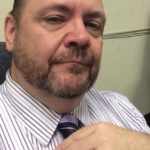
“In light of the most recent current events, Holocaust education is more important now than ever. It’s our sacred duty as teachers to inspire our students to be a voice of reason and understanding that the events of 80 years ago cannot be permitted to happen again. Holocaust education can be the inspiration for students to see the evil and work against it.”
William Mason teaches American History & Government and Holocaust Studies at Bishop Loughlin High School in Brooklyn, NY.
Let us know: How do you hope to inspire your classroom in the New Year?

CURRENT EVENTS
TEACHING

“It is one thing to read about hateful actions in other cities across the US, but this is different. This hits too close to home. Hate is in our backyard.”
Anyone who knows me would say that I am infrequently at a loss for words; however, the events of last weekend have caused me to struggle with a way to verbalize my feelings and process the images. On Saturday and Sunday, and several times since then, I have opened my social media accounts, determined to write an impassioned post about the events that touched our neighboring community and came up short each time. The only thing I could think to say is that these events are not what real Virginians stand for and the fact that I had just spent the concluding two days of our first week back-to-school discussing antisemitism and hatred made it unfathomable to have such a local and contemporary example. In my heart though, these words were not enough.
Charlottesville is a “big sister” city to the small city of Staunton that I have called my home for the past five years. Like Staunton, it has many traits that are more small-town than truly city. The downtown areas of both are dotted with locally-owned restaurants, boutiques and antique stores set against the backdrop of historical architecture, and the footsteps of a rich and sometimes challenging past. Like Staunton, it is a place where history is always present, sometimes taken for granted, but frequently a topic of conversation. Both cities are composed of moderately diverse populations; populations that have had their struggles, but who have, at least in recent years, dealt with them largely through peaceful discourse.
For me personally, Charlottesville holds a special place in my heart. It is the city where our daughter was born, six weeks early with a team of doctors on standby at the University of Virginia hospital. It wasn’t part of our plan, which didn’t include anything except our local hospital closer to home, but for the rest of our lives and hers, Charlottesville will always be a part of our story. It is a city I visit frequently for other reasons as well, to socialize with my friends, to utilize their airport, and to seek out its stores. Now, it will also be a location that I think of in other ways—as the home to events that will be ingrained in the minds of Americans for a long time to come.
As the weekend drew to a close, I found myself grappling with what to say and do when students arrived in my classes on Monday. In the back of my mind I was in “teacher-mode,” but like the social media post, clear answers were not forthcoming. I knew that our class discussions on Thursday and Friday had provided them with a foundation, but giving them both space and guidance to process the events was of foremost concern.
Going into Monday, I will say that I was thankful for incredible colleagues and friends who were available to bounce ideas off of as we collectively searched for ideas on how to aid our students. I was also grateful to have many resources available to help get the conversation started. Between Echoes and Reflections, USC Shoah Foundation’s IWitness, and the United States Holocaust Memorial Museum (USHMM), there were options for each of my classes for Monday and the days to come.
I began each class on Monday by allowing students simply to speak out, question and share. The one theme that resonated through and through was the discomfort of proximity—these hateful acts occurred in a place where my students eat dinner with their families, where their parents work, where older siblings attend college, and where many of them hope to find themselves post-high school. Over and over, I heard variations of what Henry, my first student of the day, shared, “It is one thing to read about hateful actions in other cities across the US, but this is different. This hits too close to home. Hate is in our backyard.”
Throughout the day, we talked about respectful discourse utilizing the framework of a mini-lesson created by USC Shoah Foundation’s IWitness entitled, “Promoting Effective Conversation Skills.” This lesson proved powerful not only for its fostering a skill that is sometimes overridden by emotion, but also because it includes the testimony of Henry Oertelt, who is also a featured survivor in the Echoes and Reflection’s unit, “Contemporary Antisemitism.” His words are powerful and need to be shared:
“…it is time for people to recognize that the world is made out of many, many different people, different colors, different sizes, and all kinds of differences…. it’s about time that we recognize that. It’s about time that we learn to live with it. And one way to learn to live with it is…we start to learn about each other, and while we may not agree with the ideology, and the lifestyle of other people, it is time to know about them, to respect them, as I expect them to respect me.
And if this can come done, and I think we’re making some progress, not a lot, but I see some progress here and there. If this can come about, then I think the world can be a much better place….That’s basically, my main message is because I tell them I am the prime example of what can happen to people that are suffering under prejudicial circumstances and biases and when nobody speaks up…we have to learn to speak up when we see prejudice and hatred.”
In the days since, we have talked about white supremacy more extensively than I have in years past. I have shared with my students the USHMM “Voices of Antisemitism” podcast by former Neo-Nazi Frank Meeink to show students that there is a path forward, even from the pit of hate. Students have discussed, debated, and respectfully disagreed as we have talked, and there is no doubt in my mind that this will continue for days and weeks to come; something I view with optimism. Although it feels at times like a small step, we as educators must firmly keep in mind every single day that our students truly do have the power to change the world. They are on a path to discovering how to be responsible citizens and it is our job to guide them. During a week such as this, it may be hard to come up with the right words, but we trust in the process, and we find the way.

ANTISEMITISM
CURRENT EVENTS

In the face of the ugly and violent expressions of Neo-Nazi and white supremacist ideology seen this weekend in Charlottesville, Virginia, we asked the question: What choices will we make? What will we tolerate?
It’s been inspiring to see the ways in the past 48 hours that people all over the country are making a choice, taking a stand, and letting their voices be heard. As friends, educators, parents, and those interested in advancing Holocaust education and working to combat hate, we hope you’ll consider some of the following action steps:
(1) If you are a teacher or know a teacher, check out/pass along our professional development programs and online resources to support meaningful Holocaust education.
(2) Inquire about how the Holocaust and genocide are taught in your local schools. Advocate for teachers’ access to professional learning opportunities.
(3) Find out if your state mandates the teaching of the Holocaust and other genocides, and what you can do to support these policies.
(4) Volunteer and support organizations that promote Holocaust education, combat hate, and work for social justice. You can begin by contacting your local ADL office here.
(5) Educate yourself about hate groups and extremism in the United States. Recruitment of young people is a primary focus of these groups.
(6) Stay connected with us! Sign up for our newsletter and follow us on Twitter and Facebook.
We are guided by the words of Elie Wiesel, “The opposite of love is not hate, it’s indifference.”
Thank you for your commitment!

HOLOCAUST EDUCATION
TEACHING

We live in a world that moves fast. We run from one thing to the next while texting our half-formed thoughts in 140 characters or less. We are bombarded with sound bites and news headlines. At Echoes and Reflections, however, we believe that it’s critical to invest in slowing down and making time to engage in deep learning and reflection with one another. We especially believe this when it comes to learning about the Holocaust.
We can all agree that professional development for teachers is critical, and that during the school year your time is limited, which is why we are proud to offer a range of programming that is short, focused, and introduces you to the content and pedagogical skills needed to effectively teach about the Holocaust.
Beyond our webinars and half- and full-day programs, we are also responsive to those of you who want to enhance your knowledge about the Holocaust, explore new instructional strategies for the classroom, and make connections to a network of like-minded educators. This is why we sponsored two advanced programs this summer: the Echoes and Reflections Advanced Seminar at Yad Vashem and the Charlotte and Jacques Wolf Educators Conference on Echoes and Reflections held at the Anti-Defamation League.
The nearly 60 educators from across the country who participated in these two programs have worked with Echoes and Reflections in the past, are currently using the materials in their classrooms, and wanted to learn more! They dedicated their time, knowledge, and experience to join these professional learning experiences. Each of the 60 has a story to tell about participating in these programs; we have chosen to share highlights from six of them:
Building Confidence with New Teaching Tools
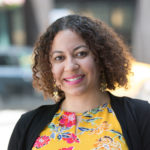
Luz Brito has been teaching English as a New Language (ENL) for fourteen years at DeWitt Clinton High School in the Bronx, NY. Brito attended the Charlotte and Jacques Wolf Educators Conference in both 2016 and 2017. Participation in the Wolf Conference has sparked her interest in teaching about the Holocaust and she finds the Echoes and Reflections resources to be practical and engaging for her student population of English Language Learners.
After the Wolf conference, Brito shared that she now understands the importance of teaching about the Holocaust as a human story, and has decided that survivor testimony and diary entries will be incorporated into all of her Holocaust lessons.
“Meeting and hearing from Holocaust survivors is a privilege that has inspired me even more to teach about the Holocaust. Each of their testimonies has renewed my commitment as an educator to teach my students to become responsible and caring citizens. Listening to survivors’ personal accounts of the Holocaust is a unique experience,” Brito said.
A Life Changing Experience
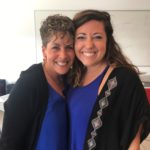
Nicole Barth is a US History/AP Government teacher at South Forsyth High School in Cummings, GA. One year after being introduced to Echoes and Reflections and using the resources in her classroom, Nicole Barth attended the 2017 Echoes and Reflections Advanced Seminar at Yad Vashem.
Barth journeyed to Israel with the hopes of being able to explore a country she had never seen before and learn from the best in the field. However, she claims that her experience far exceeded her original expectations, “What I got out of this trip was so much better. I made lasting friends and was able to network with other educators whom I can continue to work with and use as resources.”
Listening to survivors speak at Yad Vashem was a life-changing experience for Barth. She felt that every story was both extremely meaningful and unique. Now that Barth has had the opportunity to attend the Advanced Seminar she is invigorated to return to her classroom and share the knowledge she gained with her students.
Holocaust Educators Have Heart
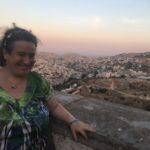
Emily Bengels is an theater and French teacher at Readington Middle School in Whitehouse Station, NJ. As someone who has dedicated her life to teaching and empowering youth and has experienced firsthand acts of contemporary antisemitism in her community, Bengels believes that now more than ever she must work towards fighting hate. She strives to do this by promoting compassion, love, and understanding among her students through the lessons and teachings of the Holocaust.
Prior to attending the Advanced Seminar, Bengels had used many of the Echoes and Reflections’ lessons in the classroom. Bengels applied for the Advanced Seminar to gain more knowledge about human resilience in connection with the Holocaust. She feels that Echoes and Reflections is a model program for its emphasis on individual spiritual resistance.
“My new saying is: Holocaust educators have heart,” said Bengels in reference to her lasting impressions of the Advanced Seminar.
A Meeting of the Minds
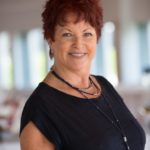
Wendy E. Lockard is the reading specialist at St. Jerome Catholic School in Ft. Lauderdale, FL. Lockard has a long history with Echoes and Reflections. She first learned about the program through the Anti-Defamation League’s “Bearing Witness” program in 2011, hosted two professional development programs that year, and participated in the Charlotte and Jacques Wolf Educators Conference on Echoes and Reflections in 2014.
Returning this year for the 10th Annual Wolf Conference, Lockard hoped to gain new tools for connecting her students to visual history testimony and “to be in the midst of those who believe, like me, that Holocaust education is a valuable subject, and who love and dedicate themselves to Holocaust studies in order to foster greater tolerance and equality among their students.” She was not disappointed.
Like Barth and Bengels, Lockard felt the impact of being around so many dedicated and passionate educators. She describes the conference as a “meeting of the minds,” sharing that “participants strive for authentic knowledge and current methodologies to further enhance their Holocaust and social justice programs already in place. Sessions are conducted in an atmosphere of professionalism and openness which, in turn, lends itself to forge lasting friendships.”
Creating Critical Thinkers and Action Takers
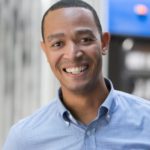
Tyrone Shaw is a World History and AP World History teacher at McKinley Technology High School in Washington, DC where he also teaches an elective course focused on Social Justice, and Holocaust and Genocide Studies. Shaw was just beginning his career in education when he first attended the Charlotte and Jacques Wolf Educators Conference in 2010 as a preservice teacher at Syracuse University. Reflecting on his experience in 2010, Tyrone shared that he learned a tremendous amount about the Holocaust and best practices for teaching about this difficult topic.
He returned this year for the 10th Annual Wolf Conference with an expectation of refreshing his pedagogy for teaching about the Holocaust and learning about new strategies from colleagues, but gained much more. The conference exceeded Shaw’s expectations and gave him a renewed sense of purpose when teaching about the Holocaust. He has been inspired to begin incorporating some of the new content he learned into his Holocaust lessons this year.
What motivates Shaw to teach about the Holocaust? “I want my students to understand what injustice looks like, and the signs that indicate it is happening so they can name it when they see it happening around them,” he said.
Time to Reflect
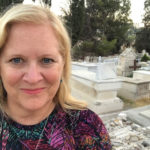
Jill Dragiff is a social studies teacher at Christ Church’s Academy in Jacksonville, FL. Dragiff has spent the past five years engaging with Echoes and Reflections through its online courses and webinars. After receiving an invitation to apply to the Echoes and Reflections Advanced Seminar at Yad Vashem and gain the opportunity to meet some of the experts behind this Holocaust education program, she immediately applied.
“The description of this program sounded like something I could only dream of being able to do… I hoped to meet other educators who were as passionate as I am about Holocaust education and to learn from their perspectives and experiences,” said Dragiff.
Like Shaw, Dragiff believes that by teaching the lessons of the Holocaust she can fight intolerance and foster increased levels of empathy among younger generations. Dragiff was further inspired by how the sessions consistently gave her the time to reflect on how students absorb the material, which she believes will make her teaching more effective and give her students’ a deeper connection to the Holocaust. “If we concentrate on teaching our students about the life of individuals, families, communities— their hopes and dreams as well as their life experiences —we will remember them as people and not numbers,” said Dragiff.
Slowing-Down, Learning More, Digging Deeper
Sixty educators decided to slow down, learn more, and dig deeper. They wanted to become more effective Holocaust educators and share their learning with students. They accomplished this and so much more. While we cannot offer Advanced Programs like these more than once a year, the response to these programs reminds us of the need to stay connected to the content and to one another however we can, and whenever an opportunity presents itself. Connect with Echoes and Reflections at an upcoming program.

HOLOCAUST EDUCATION
LITERATURE

Turning sixty-five can be a time to think back on one’s career while also considering whether it might not be time to retire and get to that mountain of books that have been gathering on the nightstand and spend more time with the grandchildren. For me, receiving my Medicare card has also been a time to reflect on the important people who have shaped my journey as an educator and as a person. There are many, of course, but two are at the heart of my story. One, Anne Frank, I met only through her Diary; the other Ms. Riley, was the English teacher who introduced me to Anne’s Diary, and who was instrumental in my becoming an educator.
Ms. Riley introduced me and my 7th grade classmates to The Diary of a Young Girl in 1964, the year that was to become known as “the year that changed America.” I remember vividly the race riots in major US cities; three Civil Rights workers being murdered in Mississippi; President Johnson declaring a “war on poverty”; the Civil Rights Act of 1964 being signed into law; the US contemplating entering a war that a year later one of my brothers would be drafted to fight in; and the murder of Kitty Genovese prompting inquiries into what became known as the “bystander effect.” All of this was taking place to the soundtrack from a new group out of England—The Beatles. In her Diary, Anne writes, “I live in a crazy time.” Looking back, I guess I could say I did too. It was with this backdrop that I read the Diary of a Young Girl and began to think about many of the questions that would follow me into adulthood.
I can’t say that I remember reading Anne’s Diary and thinking very deeply (if at all) about her being Jewish or that the terrible events that caused her to go into hiding were the result of a systematic assault against Jews. I didn’t know anything about Jews, or Judaism, or antisemitism. The Diary certainly wasn’t presented in the historical context of Nazi ideology, the Holocaust, or WWII. It was taught as a diary written by a young girl who was facing a very difficult situation and chronicling her thoughts and feelings. This is not a criticism of Ms. Riley’s teaching; in fact, as Professor Jessica Landfried writes, “When the Diary was published in 1952, there seemed to be a response that universalized Anne into a non-Jewish person that could represent all victims of racism. However, in the 1990s Anne reemerged as a Jewish victim and became the symbol of the Holocaust” (Landfried, 2002).
I remember the classroom discussions about Anne Frank and her Diary even though they were over fifty years ago. Ms. Riley, a young teacher, sitting on the edge of her desk, encouraged us to think about difficult topics like fear, and loneliness, and fairness. Perhaps it was the times in which we were having these discussion that has made them all the more memorable; perhaps it was just the fact that middle school students are often trying to make sense of the world in which they live and have a strong, if not idealistic, sense of fairness in human relationships. The most memorable discussions were the ones that focused on those who helped the Franks and the others in hiding. Ms. Riley asked us to think about what makes a person help another even at great risk. On January 28, 1944, Anne writes, “The best example of this is our own helpers, who have managed to pull us through so far and will hopefully bring us safely to shore, because otherwise they'll find themselves sharing the fate of those they're trying to protect. Never have they uttered a single word about the burden we must be, never have they complained that we're too much trouble. ..That's something we should never forget: while others display their heroism in battle or against the Germans, our helpers prove theirs every day by their good spirits and affection.”
These discussions had a great impact on me in two ways. One, I wanted to be just like Ms. Riley and teach great pieces of literature and have students discuss complex themes and grapple with questions like the ones Anne’s Diary posed. My journey to becoming an educator began in 1964. The second is more complicated. At the end of reading The Diary of Anne Frank, Ms. Riley challenged us to ask ourselves if we would have helped Anne Frank. A sound pedagogy for teaching about the Holocaust does not ask students to imagine what they might have done, as no one can ever truly answer such a question from the comfort of the present, but this was 1964, and there was no “pedagogy for teaching about the Holocaust.” There was just a young, idealistic teacher asking soon-to-be teenagers to think about the kind of people they wanted to be. I carried that question with me throughout my life. At various stages I thought I knew the answer but then something in my life would change and I would have to admit to myself that I was back to not knowing. The most memorable was when I had my own children and realized that my answer was “No, I would not help Anne Frank if it meant putting my daughters at risk.” And then my daughters became adults and I thought, “Yes, I would help Anne Frank.” And, round and round for over 50 years I struggled with the question Ms. Riley had posed to us.
Not long ago, I came across a quote that is attributed to Anne Frank, and even though I am unable to verify she was the author, I like to believe she was. The quote, “Our lives are fashioned by our choices. First we make our choices. Then our choices make us,” helped me understand what Ms. Riley had been asking us. I believe the question she asked was not meant to be literal, but symbolic; it was an opportunity to begin to explore what it means to be a good person, a fair person, a person who takes risks, and a person who refuses to be a bystander. She was also impressing upon us that the choices we make as young people begin to guide our lives, as one good (or bad) choice leads to another and another until they have simply become who we are.
My choice to become an educator resulted in working with thousands of students and hopefully helping them love literature, to think deeply about what they were reading and the human relationships that literature helps readers explore. Working with students led me to other choices in the education field including working closely with teachers and developing curricula, including Echoes and Reflections. My choice to keep the story of the Holocaust relevant for generations to come and to keep Anne Frank’s story alive was a choice that was borne out of a deep respect for a young girl who, in one of her last diary entries before being arrested by the Nazis, wrote, “I still believe, in spite of everything, that people are truly good at heart.” At every juncture of my personal and professional journey, I have made choices and over time those choices have made me.
As for teaching about the Holocaust, I have been in big cities and small towns in every region of the country. In some places teaching the history is mandated and in other places teachers are taking a risk to teach this content—some of their students are hearing that the Holocaust never happened from social media or even in their own homes. These teachers have made a choice and over time that choice has made them.
Your students live in their own “crazy time,” and are trying to make sense of their world. Let’s do all that we can to help them make brave and caring choices—choices that will eventually make them brave and caring people.
Join the conversation! We invite you to share about a teacher or book that had an impact on your life, or specifically, share what Anne Frank has meant to you.
Deborah Batiste is the Echoes and Reflections Project Director at the Anti-Defamation League (ADL). She resides in Ocean Pines, MD and has facilitated professional development programs for Echoes and Reflections across the United States since 2005.

TEACHING

Recently, I incorporated Holocaust survivor testimony into my English Language Development (ELD) classes as a way to reinforce students’ listening and speaking skills, and activate their engagement in the learning process. It was very powerful to see how focused students became as they listened to these individuals share some of their most personal experiences.
Listening and speaking are difficult skills to master, especially when one is developing English as a second language. Usually students do the bare minimum and might give me three verbal sentences to summarize a five-page story. However, when practicing this skill with survivor testimony, students seek to fully explain the circumstances. They recognize the importance of the content and want to convey what they have understood. When they cannot find their own words to explain, they refer to a specific part in the clip. That step, referencing text, happens naturally, and demonstrates how well they are able to comprehend complex concepts and information.
Nationally the English language learner (ELL) population is an estimated 4.9 million and the states with the highest ELL population are California, Illinois, Colorado, Alaska, Nevada, New Mexico, and the District of Columbia. Among this student population, the graduation rate varies widely from state to state with an average of 60% (Mitchell, Corey). That number drops for students who have not re-designated as fluent English proficient within four years of entering a school in the US (Maxwell, Lesli A.).
Middle and high school aged English language learners are required to meet academic standards in all core classes just like their native English speaking peers. They must take and pass their content classes in order to advance from grade level to grade level, receive a diploma, and have access to higher education. This challenge can be overwhelming for both teacher and student, but developing a well-rounded student and English language skills must take place in tandem with content learning. It is a shared responsibility, not just the obligation of the ELD instructor.
To meet these needs, it is essential for teachers to have access to relevant, impactful, rigorous resources that can easily be adapted for various skill levels. Resources must inform, challenge, and elicit meaningful student engagement. These types of resources can be difficult to find in a ready-to-use format.
The topics and themes made available through Echoes and Reflections are of high interest to my students. This content both provides a valuable outlet for expression and engages students with materials that promote higher-level thinking, prompt questions, and elicit discussions that develop critical academic skills. Primary sources such as letters, diary entries, photographs, and clips of testimony provide material, which is accessible to the various English fluency levels.
For example, at the end of one such lesson, a student told me, “I like these stories. They are important.” When I inquired as to why he felt that way, he explained that in Colombia he had heard about the Holocaust and was interested in learning more. This, for me, was yet another affirmation of the wealth of knowledge students like him can offer, and how those perspectives can be drawn on to expand both their content skills and their English skills.
Students of diverse backgrounds and varying skills bring with them valuable perspectives that when tapped into enrich the learning of all students. As teachers, we must believe in the value of including all students in our daily lessons. Often, it is the lack of time and resources that keeps many of us from bridging this gap. The resources provided by Echoes and Reflections are one way to address this gap, while also profoundly impacting their engagement in the learning process.
Lesly Culp works closely with Echoes and Reflections as Head of Programs for Education at the USC Shoah Foundation – Institute for Visual History and Education

HOLOCAUST EDUCATION
TEACHING

Why do people all too often talk, or even teach, about the Holocaust in ways that trivialize it or get the facts wrong?
And, more importantly, how do we get it right?
A recent incident where students in upstate New York were asked to “argue for or against the ‘Final Solution’” illustrates just how wrong things can go. Similarly, there have been a series of inaccurate comments in the media recently, everything from Hollywood being compared to 1930s Germany to extermination camps referred to as “Holocaust Centers.”
How can we explain this?
On the one hand, the constant barrage of information, and perhaps more importantly, misinformation, does not help; and when alternative accurate sources of information are not readily available – or sought out – such misinformation may become a substitute for facts.
In schools, we see efforts such as that in New York and other locations where teachers, often with the best of intentions, seek ways to compel students to go outside their “comfort zones” to learn about this history. Almost every year we learn of teachers assigning students to take roles of “the Jews” during the Holocaust to help them develop empathy for the victims, largely resulting in upset, complaint, and distress for students, families, and the school community. While simulation-type activities may seem to be a compelling way to engage students, ultimately they trivialize the experience of the victims and can leave students with the impression that they actually know what it was like during the Holocaust.
What we can take from examples such as those described, is the complexity of both teaching, and really learning, about the Holocaust.
On the positive side, due to media attention, we have also seen a broader awareness in the general population that Holocaust education is critical and relevant. At Echoes and Reflections – a partnership program of the Anti-Defamation League, USC Shoah Foundation, and Yad Vashem – we have worked with almost 40,000 committed educators since 2005, providing them with authentic and credible materials and resources for the classroom.
How can this be addressed?
The truth is, the Holocaust is not easy to understand and certainly challenging to teach. Yet, teachers should not shy away from the challenge. We want them to have the confidence, knowledge, and skills to approach this teaching with commitment and courage. While there are a range of excellent educational resources and activities available to educators, which can help to provide accurate information about the Holocaust, without a sound pedagogy for teaching this complex topic, the impact will be limited and the impact will likely not last.
Recognizing this, Echoes and Reflections recently released “Pedagogical Principles for Effective Holocaust Instruction” and these principles include:
- Define terms;
- Provide background on the history of antisemitism;
- Teach the human story;
- Make the Holocaust relevant;
- Encourage inquiry-based learning and critical thinking; and
- Ensure a supportive learning environment.
Beyond supporting effective teaching about the Holocaust, we ALL have the opportunity to use the Holocaust’s current presence in larger community conversations and in the media as a teachable moment, and as a platform to encourage critical thinking and dialogue beyond the school walls.
What can you do?
Stay curious, and ask questions. As we are reminded of just how complex the story of the Holocaust is, we should be willing to question what we are hearing in the media or from other sources, and ask whether it makes sense. If it doesn’t, question the assumptions or misinformation, and seek out accurate and reliable sources of facts.
Keep talking. Engage family, friends, neighbors, and when appropriate, policymakers, in a dialogue about how you want the Holocaust to be remembered and discussed. Let’s continue to affirm the societal importance of educating and ensuring that the meaning and relevance of this watershed event in history is not lost.
Make connections. Ultimately, our goal is to reach young people to build the next generation of champions who will remember this history and tell the story. To do this we need to connect with families and caregivers and ensure that they not only understand the stories their children are hearing, but that their children’s schools are teaching about the Holocaust with proper context and sound instructional strategies.
How then do we start to get it right? We do all of the above, we stay engaged with the world, we keep talking and connecting, and in the words of Holocaust survivor Roman Kent, who was recently interviewed by Mic, we never let ourselves forget that “Ignorance is not an excuse.”




This site contains links to other sites. Echoes & Reflections is not responsible for the privacy practices or the content of such Web sites. This privacy statement applies solely to information collected by echoesandreflections.org.
We do not use this tool to collect or store your personal information, and it cannot be used to identify who you are. You can use the Google Analytics Opt-Out Browser Add-on to disable tracking by Google Analytics.
We currently do not use technology that responds to do-not-track signals from your browser.
Users may opt-out of receiving future mailings; see the choice/opt-out section below.
We use an outside shipping company to ship orders. These companies are contractually prohibited from retaining, sharing, storing or using personally identifiable information for any secondary purposes.
We may partner with third parties to provide specific services. When a user signs up for these services, we will share names, or other contact information that is necessary for the third party to provide these services.
These parties are contractually prohibited from using personally identifiable information except for the purpose of providing these services.
1. You can unsubscribe or change your e-mail preferences online by following the link at the bottom of any e-mail you receive from Echoes & Reflections via HubSpot.
2. You can notify us by email at info@echoesandreflections.org of your desire to be removed from our e-mail list or contributor mailing list.
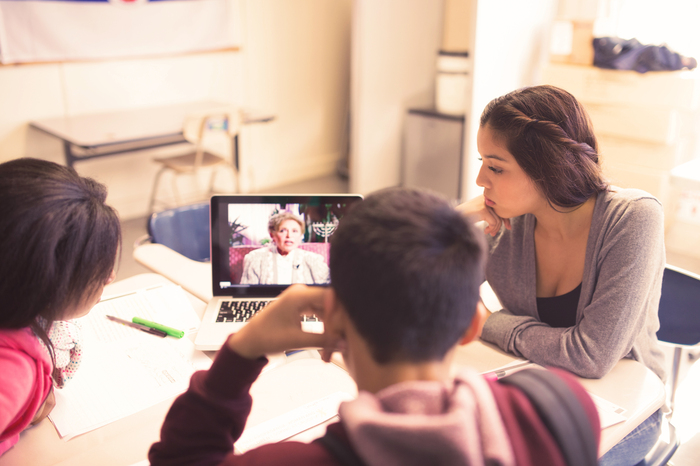





 English
English